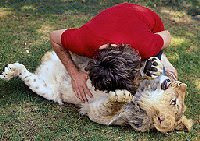Alright, I'm getting on my soapbox now...
The downturn in the economy has resulted in a decrease in the number of animals adopted from shelters. This is obviously bad for the animals, but in reality it shows that people are acting responsibly, because taking on an animal demands dedication, in terms of time, love, and finances. The animal deserves nothing less. If you can't promise you can financially provide for an animal, you shouldn't take one on.
On the other hand, the number of people abandoning their animals, either to shelters or just outright ditching them, has sharply increased, and people blame the economy. Now, I'm sure that anyone heartless enough to do that probably wouldn't bother reading my articles here, but if I'm preaching to the choir, then so be it...
The main issue about any pet you may have is
family. As you can see over and over again in the posts I've made here, an animal thinks, feels, and loves just as much as you or me. To give an animal a home and then just run away from it is just as deeply traumatic for the animal as it would be for you if your parents had done it to you. And I don't care what you think your financial problems are, you took on the responsibility and you need to see it through.
In the local newspaper there was a story of a family that dumped their pets because the "man" of the house got laid off. The family made sure, though, that they still kept their cable TV. These heartless bastards should never have been allowed near an animal in the first place. If they merely wanted something disposable to ornament their life, they should have bought a Gucci somethingorother. At least they could ebay
that when things didn't go according to their liking.
I realize that part of the problem is the horrible, will-not-die myth that animals are instinct-driven: "We can just abandon Snowball and she'll be OK because cats are natural-born hunters."
ANY animal has to
LEARN how to live in its environment. That's why I stress the concept of
SOCIALIZATION--the process of
learning what's necessary
in the society you live in. A cat that was born and raised in a human household never learned the skills of hunting.
Your pet is dependent on you for his quality of life. Love, nurturing, food, and shelter. If you love your cable TV more than you love your pet, find a good home for him now, because you are not capable of providing what he needs.

Another aspect of the problem is the unthinking Easter (or other time) gift of a cute little animal--that is soon abandoned to "live in the wild"--as if there's any wild around.
NY Times article at this link.
How can people continue to act as if animals are mere things? If you want to give a cute fluffy little thing for some holiday, Toys R Us has plenty of stuffed toys. A bunny is a thinking, feeling, loving being. They're a bit mysterious to me, which is why I would never take one on, but
for the right person they make wonderful companions. They don't deserve to be shoved in a kid's face on Sunday and shoved out the door on Monday.
That NY Times story linked above mentions that Florida requires a $100 permit to own a python. That's probably a good thing. I don't believe in bans on any animal ownership, but $100 will probably weed out the unthinking people who want a pet to satisfy whatever whim just crossed their mind. $100 is probably a good level to get them to say, "I don't know about this..."
If you do love your pet, you can prepare for financial shocks in easy ways:
- Set aside a little money each payday, for veterinarian bills. Veterinary care is usually not very expensive, but when something major happens, it can be costly. Plan ahead.
- Preventive medicine helps. Keep their vaccines up to date.
- Look into pet health insurance. That's putting aside some money each payday into the insurance company's hands, but if you suddenly face a big bill, it could be useful.

- Spaying/neutering your pet will prevent the sudden arrival of a bunch more pets. It isn't really very expensive, either. check with your local humane society; there may be plans available to lower the cost even more.
- If you are ready to take on a new pet, adopt one from a shelter. It's really a shame our president didn't set a good example in this area. Thousands of abandoned animals are killed each year because there simply is no one to take care of them.

An animal is a bundle of love. They deserve the same. They can be traumatized and made neurotic by bad treatment. Don't let a few dollars be the reason that happens to your little guy.
 If you really want to go orange, do something for someone who always wears orange. Find a big cat sanctuary and donate something for the tigers. Caring for a big cat is an expensive task. Or you could buy them a toy, like maybe a boomer ball (check with the sanctuary first to see what they need and approve of). While the tigers receive the best of care in a sanctuary, there sometimes isn't a whole lot for them to do. A toy can brighten up their day.
If you really want to go orange, do something for someone who always wears orange. Find a big cat sanctuary and donate something for the tigers. Caring for a big cat is an expensive task. Or you could buy them a toy, like maybe a boomer ball (check with the sanctuary first to see what they need and approve of). While the tigers receive the best of care in a sanctuary, there sometimes isn't a whole lot for them to do. A toy can brighten up their day.
















